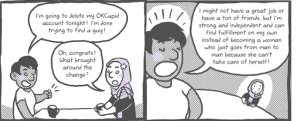
An angry, balding person points condescendingly at the viewer.
The US Presidential election results have left many people shocked, depressed, and afraid.
The victor, Donald Trump, spent his campaign threatening entire populations within American society – Mexicans, Muslims, LGBTQIA+ folks, and women – and with his win, many are shell-shocked and panicking about their futures.
And with good reason: Already there are reports of spikes in hate-crimes and violence against Black, queer, and Jewish people. Trump has announced plans for immediate deportations of millions of people, and he has hired white supremacist Steve Bannon as one of his top aides.
This video of a woman yelling at a Muslim woman on the train gives a pretty clear example of how this election has emboldened bigotry and hatred.
As Rebecca Traister wrote, “The heartbreak of this election…[is] the loss of the idea that this country was so very close to being better, more inclusive, more just, and more representative.”
It can be very hard to stay balanced and process your own emotions when fear and viciousness surround you. What’s more, as many people are working to figure out how to handle their new reality – whether in mourning or in protest, in public or in private – the emotional abuse carried out by Trump supporters has continued and even escalated.
Perhaps this isn’t surprising.
After all, Trump utilized tactics of emotional abuse throughout the campaign, and his tactics paid off nicely for him, empowering his followers and sending the message that emotional abuse is a legitimate (and even successful!) form or discourse.
In fact, since Election Day, some new tactics have emerged, along with some revised old one. This makes the healing process even harder.
Here are some of the new tactics of emotional abuse to be wary of as you work through the impact of these elections.
1. Mocking
The first trend I noticed in Facebook feeds right after the election was the new language of “sore loser.”
Many of those who were expressing deep sadness, mourning, or disappointment were attacked Trump supporters coming onto their feeds with mocking comments, like “Haha, you’re just upset that you lost,” “Grow up and stop being a sore loser,” or “Stop crying.”
This tactic is the kind of behavior that we’re taught in preschool not to engage in. But the Trump campaign has brought back many of those toxic behaviors that we thought society unlearned long ago.
2. Gaslighting
Gaslighting is a manipulative tactic aimed at twisting reality and making you seem and feel confused and disoriented. And some Trumpists continue to gaslight opponents, just as they did during the campaign.
This includes claims that protesters are “exaggerating” in their fears, as Rudy Guiliani said, or that the protesters are the bad guys here, as Trump himself suggested when he said that protesters are “unfair.”
In another illustration of gaslighting, Trump supporters are trying to rewrite history by claiming that Republicans accepted President Obama’s victory and embraced him as president. This completely ignores the relentless attacks on Obama’s personal credibility throughout his campaign, the Trump-led “birther” movement undermining his very identity, the constant lie about Obama being a secret Muslim (as if Muslims aren’t allowed to be president anyway), responsible for ISIS, and the anti-Christ.
The complete denial of that reality is pure gaslighting, based on lies and manipulations.
3. Infantilization
Some Clinton supporters and protesters are being called “babies” who are throwing “temper tantrums.”
Turning political protest into mere “crying” or being like a “baby” is a clear and abusive tactic for putting a person down – especially women, who are often criticized for being “too emotional.”
4. Faux Pity
Some Trump supporters offer a kind of pity, such as, “I really felt bad for Hillary Clinton during her concession speech.”
One man, who spent the entire year trolling my Facebook page with incessant commentary about “crooked Hillary” changed his tone after Hillary conceded, admiring how nice she is when she gives in. This is exactly the same trope from 2008, in which Hillary’s popularity skyrocketed after she conceded.
Feeling sorry, or pity, for someone who is powerless is another way to reinforce their powerlessness. When you are down, pity – as opposed to compassion – only pushes you down further, and reinforces the hierarchy between abuser and survivor.
5. Faux Embracing
“Love will always trump hate,” wrote one Trump voter on my Facebook page the day after the election, adding that “gratitude and kindness are key, Elana.”
As if to say, stop protesting and being angry and just be sweet – like a good girl, so to speak.
We are hearing many Trump supporters calling for so-called “unity” and “embracing” the President-Elect – even Oprah Winfrey has called for calm niceness.
But really, these calls for “unity” or “acceptance” or “niceness” or “gratitude” are code for thing: Stop talking.
6. Silencing
“Stop it already,” another woman wrote on my Facebook page the day after the election, as I tried to understand this outcome.
“Don’t worry,” yet another Trump-voting woman wrote to me. “You’ll see how great Trump will be as president.” As if to say, your concerns are not valid and your fears and observations are completely unwarranted.
“Don’t take it personally,” another avid Trump supporter wrote on his Facebook page the day after the election, specifically addressing women, trying to prove that women do not have to fear from a Trump presidency – as if Trump did not fill his campaign with very personal attacks against women.
This is a type of gaslighting that tries to make you feel like you’re crazy for being afraid.
“Don’t worry,” wrote another Trump voter, “I can assure you that women will be fine.”
Really? He can personally assure women that they will be fine? When Vice President-Elect has made a career out of restricting reproductive rights?
These calls to “calm down,” as it were, are particularly unnerving and unsettling, and are aimed at silencing opposition – especially the opposition of marginalized people in the face of real threats to their autonomy and safety.
7. Threatening Physical Violence
Remember how Trump supporters were already threatening violence if they lost the election?
Trump told gun-owners that they could “take care” of Clinton. Former GOP Congressman Joe Walsh suggested he’d grab his musket if Clinton won. Milwaukee County Sheriff David Clarke said that if Clinton won it would be “pitchforks and torches time.”
Trump supporters said they would march on the capitol, armed, to remove Hillary Clinton from office if she won. And now, Trump is apparently in a “bind” about his promise to imprison Hillary Clinton. Today, many people are in real fear as racism and bigotry bring about an increase in real violence – Day 1 in Trump’s America.
***
If you recognize these tactics – either as an abuser or as a recipient of abuse – there are ways to change it.
In conversations with grieving and angry voters, instead of using these tactics, all you have to do is listen compassionately. And if you are experiencing emotional abuse from people around you – online or in real life – while you are grieving, remember that it’s okay to block people out of your life in order to protect yourself.
And don’t forget to engage in radical self-care and self-kindness during this difficult time.
[do_widget id=’text-101′]
Elana Sztokman is an award-winning author and sociologist specializing in gender issues in society. Her latest book is The War on Women in Israel: A Story of Religious Radicalism and the Women Fighting for Freedom (Sourcebooks 2014). She is currently at work on a book about the dynamics of emotional abuse. You can follow her on her website, on Facebook, or on Twitter @jewfem.
Search our 3000+ articles!
Read our articles about:
Our online racial justice training
Used by hundreds of universities, non-profits, and businesses.
Click to learn more




















